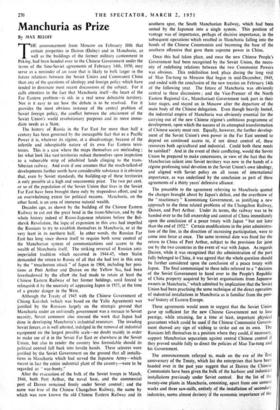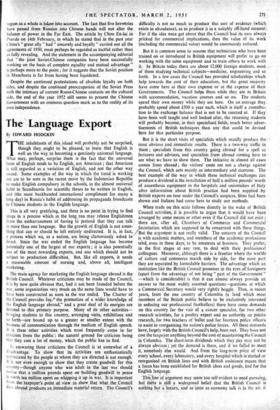Manchuria as Prize
By MAX BELOFF
THE announcement from Moscow on February 10th that certain properties in Dairen (Dalny) and in Manchuria, as
well as the buildings of the former military cantonment in Peking, had been handed over to the Chinese Government under the terms of the Sino-Soviet agreements of February 14th, 1950, may serve as a reminder of an issue that is likely to bulk larger in the future relations between the Soviet Union and Communist China than any of the questions of ideology and foreign policy which have tended to dominate most recent discussions of the subject. For it calls attention to the fact that Manchuria itself—the heart of the Far Eastern problem—is still in a real sense debatable territory. Nor is it easy to see how the debate is to be resolved. For it provides the most obvious instance of the central problem of Soviet foreign policy, the conflict between the attainment of the Soviet Union's world revolutionary purposes and its more imme- diate needs as a State.
The history of Russia in the Far East for more than half a century has been governed by the inescapable fact that as a Pacific Power it is, whatever its regime, at a disadvantage, because of the infertile and inhospitable nature of its own Far Eastern terri- tories. This is a case where the maps themselves are misleading ; for what look like vast territories reduce themselves upon inspection to a vulnerable strip of inhabited lands clinging to the trans- Siberian railway. And even if one assumes that the much-talked-of developments further north have considerable substance it is obvious that, even by Soviet standards, the builfling-up of these territories is only possible at a high and uneconomic price. The two per cent. or so of the population of the Soviet Union that lives in the Soviet Far East have been brought there only by stupendous effort, and to an overwhelming extent for political reasons. Manchuria, on the other hand, is an area of immense natural wealth.
Decades ago, as shown by the building of the Chinese Eastern Railway to cut out the great bend in the trans-Siberian, and by the whole history indeed of Russo-Japanese relations before the Bol- shevik Revolution, the logic of expansion in this area had impelled the Russians to try to establish themselves in Manchuria, or at the very least in its northern half. In other words, the Russian Far East has long since shown itself to require both some control of the Manchurian system of communications and access to the wealth of Manchuria itself. The striking reversal of Russian anti- imperialist tradition which occurred in 1944-45, when Stalin demanded the return to Russia of all that she had lost in this area by the " treacherous attack " of Japan in 1904, including her posi- tions at Port Arthur and Dairen on the Yellow Sea, had been foreshadowed by the effort she had made to retain at least the Chinese Eastern Railway of her former holdings, until forced to relinquish it by the necessity of appeasing Japan in 1935, at the time of a greater danger in the West.
Although the Treaty of 1945 with the Chinese Government of Chiang Kai-shek (which was based on the Yalta Agreement) was justified by the Russians largely on the strategic ground that Manchuria under an unfriendly government was a menace to Soviet security, Soviet comment also stressed the work that Japan had done in developing Manchuria's industrial resources. The invading Soviet forces, as is well attested, indulged in the removal of industrial equipment on the largest possible scale—no doubt mainly in order to make use of it in the Soviet Far East or elsewhere in the Soviet Union, but also to render the country less formidable should its political control fall back into hostile hands. These seizures were justified by the Soviet Government on the ground that all installa- tions in Manchuria which had served the Japanese Army—which meant in fact the entire industrial plant of the country—were to be regarded as " war-booty."
After the evacuation of the bulk of the Soviet troops in March, 1946, both Port Arthur, the naval base, and the commercial port of Daircn remained firmly under Soviet control ; and the same was true of the Chinese Changchun Railway, the name by which was now known the old Chinese Eastern Railway and its southern spur, the South Manchurian Railway, which had been united by the Japanese into a single system. This position of vantage was of importance, perhaps of decisive importance, in the subsequent operations'which resulted in Manchuria falling into the hands of the Chinese Communists and becoming the base of the southern offensive that gave them supreme power in China.
Once this had taken place, and once the new Chinese People's Government had been recognised by the Soviet Union, the neces- sity of redefining relations between the two Communist Powers was obvious. This redefinition took place during the long visit of Mao Tse-tung to Moscow that began in mid-December, 1949, and ended with the conclusion of the new treaties on February 14th of the following year. The future of Manchuria was obviously central to these discussions ; and the Vice-Premier of the North Eastern Regional (i.e., Manchurian) Government took part in their later stages, and stayed on in Moscow after the departure of the main body of the Chinese delegation. Even though heavily looted, the industrial empire of Manchuria was obviously essential for the carrying out of the new Chinese regime's ambitious programme of development, upon which the success of its attempted transformation of Chinese society must rest. Equally, however, the further develop- ment of the Soviet Union's own power in the Far East seemed to depend on continued access to, if not direct control of, these resources both agricultural and industrial. Could both these needs be satisfied? And in the event of their conflicting, would the Soviet Union be prepared to make concessions, in view of the fact that the Manchurian salient into Soviet territory was now in the hands of a regime professing total devotion to the Soviet Union's own ideology, and aligned with Soviet policy on all issues of international importance, as was underlined by the conclusion as part of these agreements of a thirty years' defensive alliance.
The preamble to the agreement referring to Manchuria quoted the changes brought about by Japan's defeat, and the overthrow of the " reactionary " Kuomintang Government, as justifying a. new approach to the three related problems of the Changchun Railway, Dairen, and Port Arthur. Under its terms, the railway was to be handed over to the full ownership and control of China immediately upon the conclusion of a peace treaty with Japan " but not later than the end of 1952." Certain modifications in the joint administra- tion of the line, in the direction of increasing participation, were to come into force at once. The same terminal date was fixed for the return to China of Port Arthur, subject to the provision for joint use by the two countries in the event of war with Japan. As regards Dairen, while it was- recognised that the administration of the port fully belonged to China, it was agreed that the whole question should be further considered upon the conclusion of a peace treaty with Japan. The final communique to these talks referred to a "decision of the Soviet Government to hand over to the People's Republic of China property acquired by Soviet organisations from Japanese owners in Manchuria," which admitted by implication that the Soviet Union had been practising the same technique of the direct operation of industrial installations in Manchuria as is familiar from the post- wae history of Eastern Europe.
These agreements would seem to suggest that the Soviet Union gave up sufficient for the new Chinese Government not to lose prestige, while retaining, for a time at least, important physical guarantees which could be used if the Chinese Communist Govern- ment showed any sign of wishing to strike out on its own. The Russians left themselves in a position where they could, if necessary. support Manchurian separatism against central Chinese control if they proved unable fully to direct the policies of Mao Tse-tung and his Government.
The announcements referfed to, made on the eve of the -first anniversary of the Treaty, which list the enterprises that have been handed over in the past year suggest that at Dairen the Chinese Communists have been given the bulk of the harbour and industrial installations previously under Soviet control. But the list of the twenty-one plants in Manchuria, consisting, apart from one cement works and three saw-mills, entirely of the installation of secondary industries, seems almost derisory if the economic importance of the region as a whole is taken into account. The fact that five breweries have passed from Russian into Chinese hands will not alter the balance of power in the Far East. The article by Chou En-lai in Pravda on 14th February, in which he stated that in the past year China's "great ally " had " sincerely and loyally " carried out all the agreements of 1950, must perhaps be regarded as tactful rather than as fully revealing. And the statement in the accompanying editorial that " the joint Soviet-Chinese companies have been successfully working on the basis of complete equality and mutual advantage " is perhaps more to the point ; for it suggests that the Soviet position in Manchuria is far from having been liquidated.
Despite the continued protestations of absolute loyalty on both sides, and despite the continued preoccupation of the Soviet Press with the intimacy of current Russo-Chinese contacts on the cultural side, the end of the year 1952 still seems to present the Chinese Government with an ominous question mark as to the reality of its own independence.



































 Previous page
Previous page